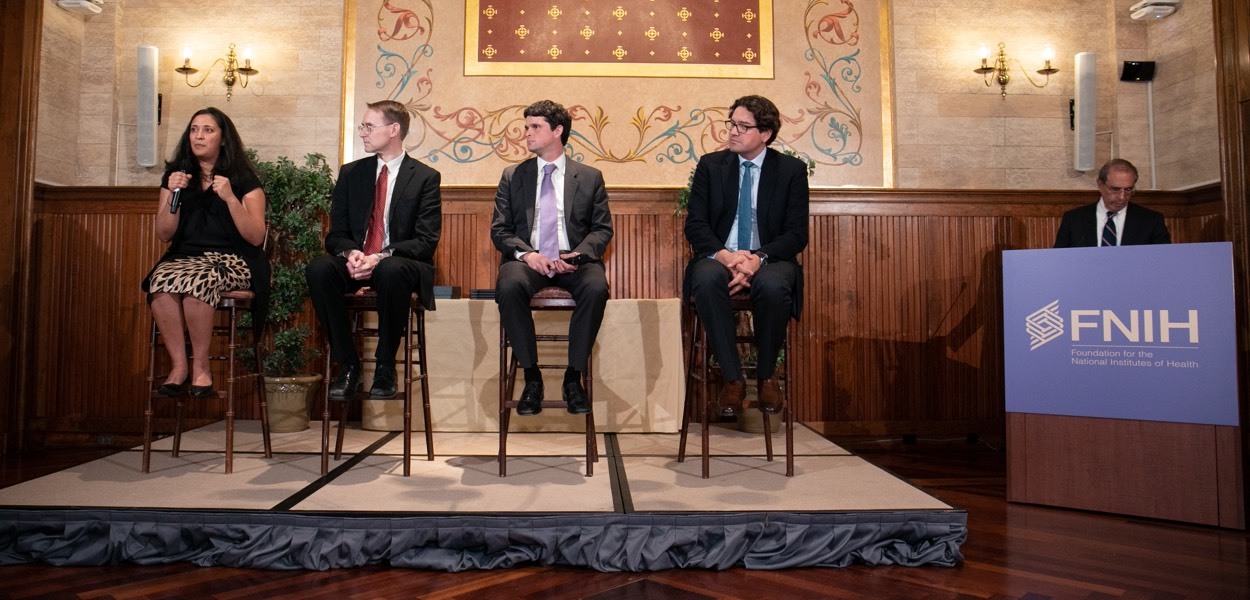Investing in the future of scientific leadership

BY TRANSFORMING THE UNDERSTANDING OF THE MICROBIOME’S CRITICAL FUNCTION IN HUMAN HEALTH, DR. BELKAID’S RESEARCH PAVES THE WAY FOR YET FURTHER BREAKTHROUGHS IN DISEASE DIAGNOSTICS AND MANAGEMENT.
One of the many ways the FNIH accelerates progress is through investment in the creativity of exceptional scientists. The organization bestows three prizes each year to recognize outstanding partners and contributors to advancing biomedical research.
Lurie Prize in Biomedical Sciences
The Lurie Prize in Biomedical Sciences is an annual prize made possible by a gift from philanthropist Ms. Ann Lurie, recognizing outstanding achievements made by a promising young scientist. In May, the FNIH honored Yasmine Belkaid, Ph.D., of the National Institute of Allergy and Infectious Diseases (NIAID) for revolutionizing our understanding of microbes in the gut and skin.
Dr. Belkaid’s groundbreaking work has shed light on the interaction between the microbiome and the immune system, as well as the crucial implications of this interaction for human health. Her research is focused on using microbes to develop novel strategies to prevent and treat diseases such as psoriasis, Crohn’s disease, allergies and autoimmune diseases. By transforming the understanding of the microbiome’s critical function in human health, Dr. Belkaid’s research paves the way for yet further breakthroughs in disease diagnostics and management.
Trailblazer Prize for Clinician-Scientists
The Trailblazer Prize was established in 2018 to highlight the essential role of early career clinician-scientists in spurring innovation in patient care.
In October, Dr. James Kochenderfer of NCI was announced as the prize winner for pioneering the development of immunotherapies that leverage chimeric antigen receptor (CAR) T-cells to treat blood cancers. His work led to the first approval by the FDA of a CAR T-cell therapy for lymphoma. He also headed the first clinical trials focused on a specific antigen for the treatment of multiple myeloma. Dr. Kochenderfer’s work is a premier example of how clinical science has the potential to create life-saving breakthroughs in the treatment of cancer.
Funding for the Trailblazer Prize is provided by the Gallin Fund at the FNIH.
Charles A. Sanders, M.D., Partnership Award
Each year, the FNIH bestows the Charles A. Sanders, M.D., Partnership Award to recognize people and/or organizations that have made significant contributions to the organization’s efforts to build, implement and nurture public-private partnerships in support of the mission of the NIH. In 2019, the FNIH proudly honored the Doris Duke Charitable Foundation and Jane Sayer, Ph.D., for their steadfast support of NIH training and awards programs to foster the research community and for their ongoing work to further the Foundation’s mission.
Funding for the Charles A. Sanders, M.D., Partnership Award is provided by the Charles A. Sanders Legacy Fund of the FNIH.

Convening leaders to chart the path to progress
Next-generation breakthrough therapies require the construction of diverse alliances to identify the best ways to treat and serve patients worldwide. The FNIH specializes in convening key stakeholders from wide-ranging sectors to identify and tackle scientific challenges and knowledge gaps to propel research forward.
As one example, in September, the FNIH hosted the 11th International Forum on Rheumatoid Arthritis (RA): Pathogenesis and Emerging Therapeutic Strategies, or IFRA 2019. The meeting brought together major scientific leaders from industry and academia in Asia, Europe and the United States, including NIH Director Dr. Francis Collins. The group represented a global consortium with a shared collective goal of accelerating discovery and innovation in RA.
A chief outcome of the meeting was laying the foundation for a future International RA Collaborative Network building on the work of existing initiatives, such as the Accelerating Medicines Partnership for RA and lupus, to foster transformative studies and facilitate international collaboration. An article published in the Annals of the Rheumatic Diseases lays out the session’s overarching themes and provides a vision for the path forward.